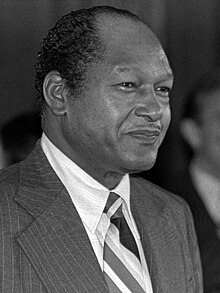
The Bradley effect, less commonly known as the Wilder effect,[1][2] is a theory concerning observed discrepancies between voter opinion polls and election outcomes in some United States government elections where a white candidate and a non-white candidate run against each other.[3][4][5] The theory proposes that some white voters who intend to vote for the white candidate would nonetheless tell pollsters that they are undecided or likely to vote for the non-white candidate. It was named after Los Angeles mayor Tom Bradley, an African-American who lost the 1982 California gubernatorial election to California attorney general George Deukmejian, a white person, despite Bradley being ahead in voter polls going into the elections.[6]
The Bradley effect posits that the inaccurate polls were skewed by the phenomenon of social desirability bias.[7][8] Specifically, some voters give inaccurate polling responses for fear that, by stating their true preference, they will open themselves to criticism of racial motivation. Members of the public may feel under pressure to provide an answer that is deemed to be more publicly acceptable, or politically correct. The reluctance to give accurate polling answers has sometimes extended to post-election exit polls as well. The race of the pollster conducting the interview may factor into voters' answers.
Some analysts have dismissed the theory of the Bradley effect.[9] Others have argued that it may have existed in past elections but not in more recent ones, such as when the African-American Barack Obama was elected President of the United States in 2008 and 2012, both times against a white opponent.[10] Others believe that it is a persistent phenomenon.[11] Similar effects have been posited in other contexts, for example the spiral of silence and the shy Tory factor.[10]
- ^ Kevin Drum, "East Coast Bias Watch", washingtonmonthly.com, July 23, 2008, citing a Google search: "3,820 hits for Wilder Effect compared to 44,900 hits for Bradley Effect". Retrieved 10 July 2021.
- ^ Payne, Gregory(1986). Tom Bradley: The Impossible Dream : A Biography Roundtable Pub. The chapter about Bradley Effect (Chapter 16 / pp. 243 – 288) is available online at "Archived copy" (PDF). Archived from the original (PDF) on January 20, 2009. Retrieved October 16, 2008.
{{cite web}}: CS1 maint: archived copy as title (link) - ^ Gary Langer (November 8, 1989). "Election Poll Problems: Did Some Voters Lie?". Associated Press. Retrieved January 19, 2013.
- ^ Reddy, Patrick. (January 20, 2002). "Does McCall Have A Chance?", Buffalo News, p. H1
- ^ Cite error: The named reference
Elderwas invoked but never defined (see the help page). - ^ III, William A. Henry (November 15, 1982). "Press: Fighting the Last War". Archived from the original on June 3, 2008. Retrieved March 1, 2018 – via www.time.com.
- ^ Perez, Simon. (October 9, 2008). "Could Bradley Effect Change November Election? Archived December 5, 2008, at the Wayback Machine" KPIX-TV, "Political Consultant Don Solem explains: 'It's not so much they're afraid to say it as they think it might be taken the wrong way.' Solem said the Bradley Effect is also known as social desirability bias."
- ^ Rojas, Aurelio. (October 9, 2008). "California poll on Prop. 8 could show 'Bradley effect' Archived October 10, 2008, at the Wayback Machine" Sacramento Bee, "'Anyone who studies survey research will tell you one of the biggest problems we encounter is this notion of social desirability bias,' [Patrick Egan, a professor of politics at New York University] said."
- ^ Tarrance, V. Lance Jr. (October 13, 2008). "The Bradley Effect – Selective Memory". Retrieved October 13, 2008.
- ^ a b Silver, Nate (October 23, 2024). "Here's What My Gut Says About the Election. But Don't Trust Anyone's Gut, Even Mine". The New York Times. ISSN 0362-4331. Retrieved October 23, 2024.
- ^ A Base Election After All? Weekly Standard; Aaron Miskin; November 11, 2008